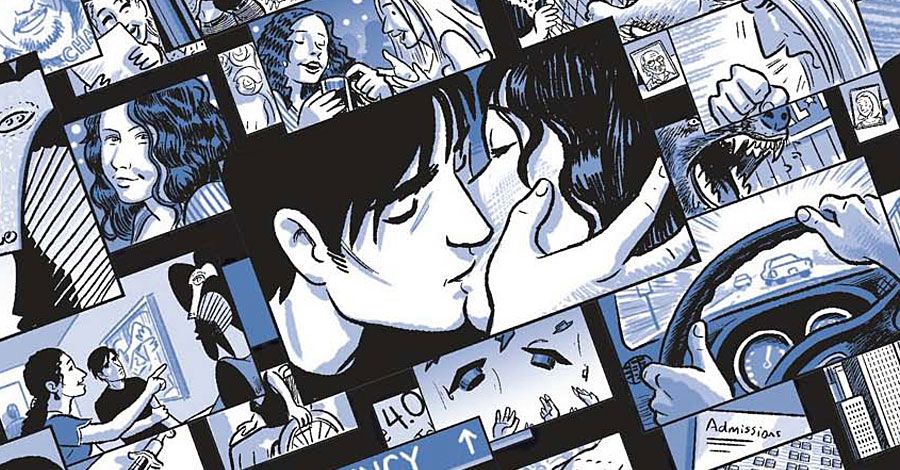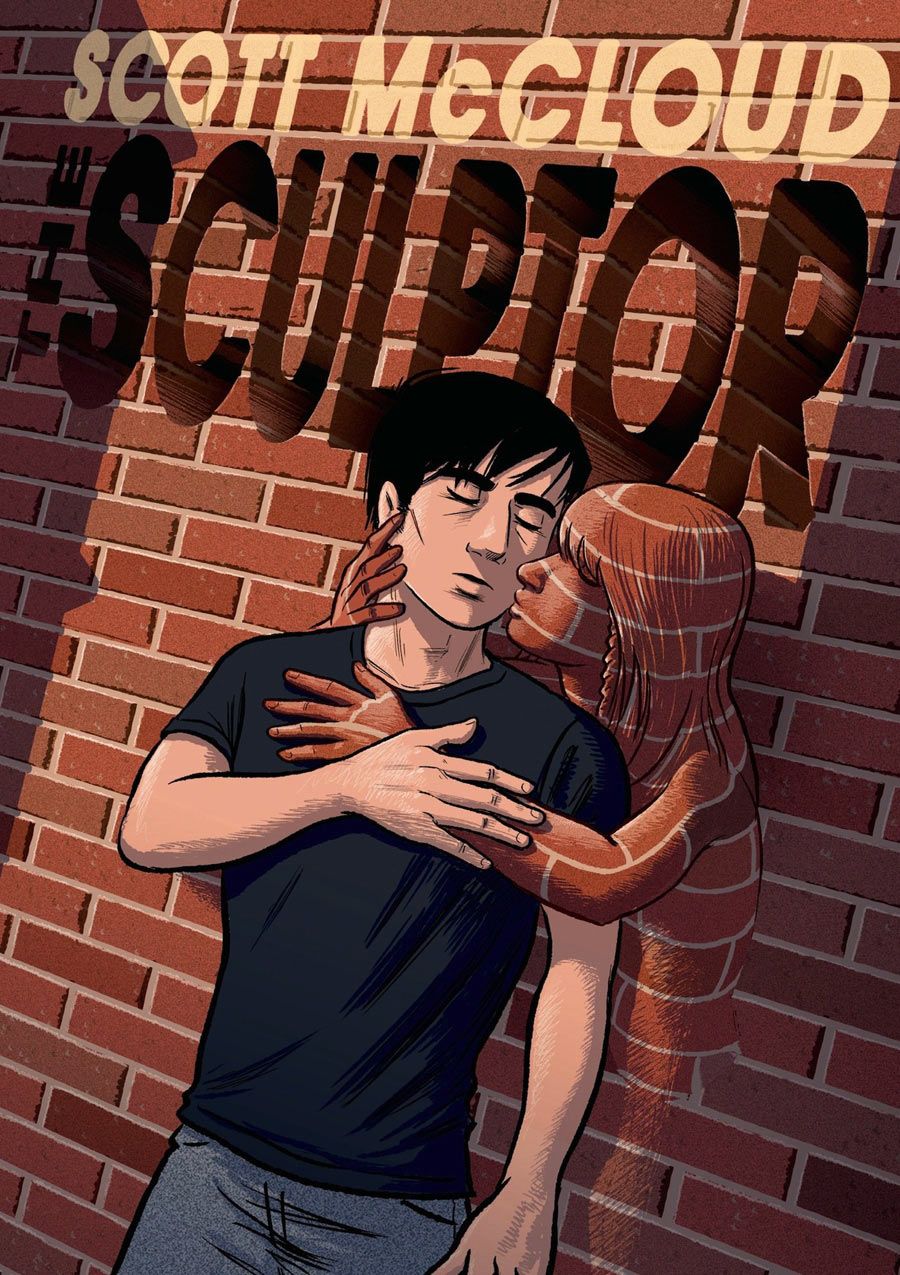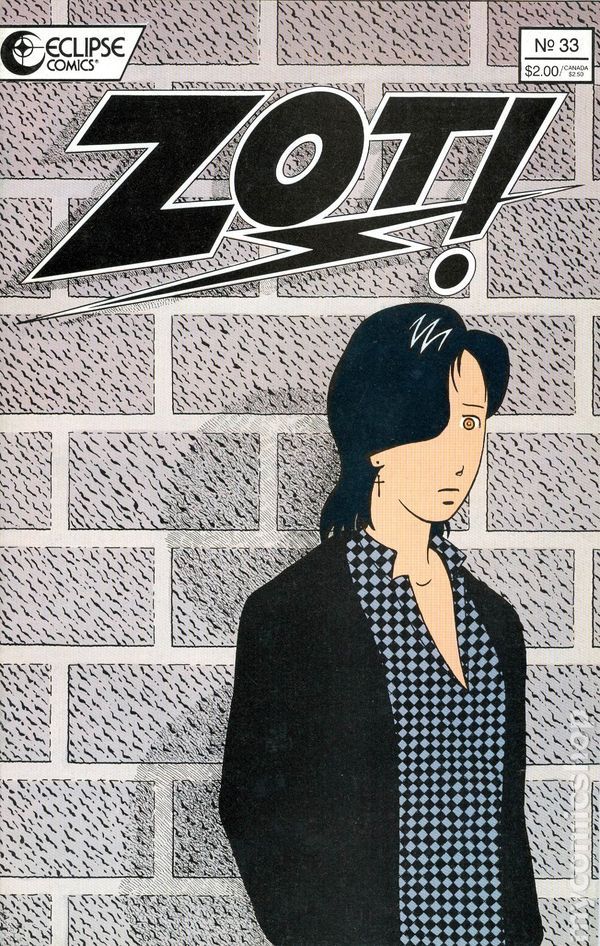Scott McCloud's Comic-Con International spotlight panel began with moderator Gene Leun Yang pointing out that both he and McCloud were cartoonists and educators. "In fact, I like to tell people that I aspire to be the Asian American Scott McCloud," Yang quipped. Clicking to a slide showing the cartoon avatar of McCloud from "Understanding Comics" next to a similarly dressed photo of Yang, he said, "I think I look more like cartoon Scott McCloud," getting a laugh from the crowd.
The spotlight panel covered McCloud's impressive comic career, from his "secret origin" to his sci-fi opus "Zot!" to "Understanding Comics," and his newest release, "The Sculptor." On the trajectory of his career McCloud said, "It doesn't always work this way, but my whole career is like one straight line... not a lot of twists and turns," aside from the difference in the types of comics he's made.
As a teen, McCloud confessed he was prejudiced against the comics medium, saying, "I thought comics were dumb." Then, he befriended Kurt Busiek in middle school in the '70s. The would-be "Astro City" writer eventually wore McCloud down, giving him a stack of "Daredevil" and "X-Men" comics, and inspiring McCloud interest in the medium.
McCloud spoke about his childhood, growing up in Lexington, Massachusetts, with a "blind rocket science inventor" father, and surrounded by brainy kids that were arty and intellectual, "peering over the fence at people who were more intuitive and organic, who could just do it and make it."
"In fact," McCloud said, "while doing 'The Sculptor,' a lot of that was about seeing if I could bury all of the technique and intellect and all that sort of stuff, and try to create something that felt like I had reached into my chest and pulled out a burning ball of inspiration and smashed it onto the page without thinking."
Yang brought up "Zot!," McCloud's superhero/sci-fi opus that began in '84, asking if it would ever be completed. McCloud admitted he has an ending in mind for every character, but doesn't know if or when he'll have the time to return to it.
"I'm like a slow-motion Roomba, slowly moving across the carpet," McCloud said of his comics-making production. "I realize I'm going to die before I get half of the things I want to done. But that's one of the things. Except it would have to be different," he said floating the idea of potential webcomic to finish some of the series.
Next, Yang asked how McCloud pitched 1993's non-fiction "Understanding Comics," and the difficulty in presenting the idea of a comic book about how comic books work. McCloud said it was easy because "Teenage Mutant Ninja Turtles" co-creator Kevin Eastman had come into money and "wanted to give back" with Tundra Press. "Thank God I was one of the people who earned out for him before the company vanished," McCloud said.
Yang presented a slide of the "Superman Adventures" series MCloud wrote for 12 issues, based on the Bruce Timm and Paul Dini animated series. "I always forget about this part of my career," McCloud said, recalling how excited he had been to introduce, essentially, a brand new version of the Man of Steel, and calling it "some of the most fun writing I've done."
"One thing I realize, looking back on your whole body of work, is that there's actually this deep concern for social justice that shows up again and again," Yang said, shifting gears. "I don't know if the general comics-reading public associates that with you, but there's a fairly intensive thread that runs through all of that." Yang listed several examples, like McCloud's 1990 issue of "Zot!" where a character comes out as gay, his late-'90s Image Comics series "The True Adventures of Abraham Lincoln," and his work with the Creator's Bill of Rights in the '80s.
"Until now, I haven't even seen that thread," McCloud admitted. "There are people being murdered for their art all over the world. There are people standing up to tremendous power, so I can't claim too much advocacy there -- or certainly no courage. When I did the story about Terry coming out in high school, to me ["Zot"#33], I felt very safe. I was working from a position of some privilege. I didn't feel that I would be attacked much. I got a few letters, but the comics community was so supportive and relatively tolerant compared to the rest of the landscape, that I felt I was taking very little risk. And there are people who take enormous risks."
Leading up to talking about "The Sculptor," Yang mentioned a "Zot!" story where villain Decko explains the brevity and smallness of human life, calling it a link to McCloud's newest book.
"I think certainly you're picking up on what's been a long-term obsession of mine," McCloud said. "I think about this way too much."
McCloud explained the premise of "The Scupltor" to the audience: A young, struggling sculptor named David Smith, meets Death -- in the form of a dead relative -- and makes a Faustian deal with him. David only gets 200 days to live, but can sculpt anything he wants. Shortly after taking the deal, he meets the love of his life, who McCloud based on his wife, Ivy.
Despite the fantastic elements in "The Sculptor," McCloud said he was "writing something that's very much about this world." "Basically, I'm using fantasy as a lever to stand apart from the world we actually live in and talk about that world; a world in which you create, you live, and then you die, and you're gone... I don't think that's fiction, but I found a way to speak of it through fiction."
"Do you think 20-something Scott McCloud would have taken that deal [from 'The Sculptor]?'" asked Yang.
"Yeah, I think that really early on, I was becoming a hermit and I was very much falling into myself. And I think at that point, I might have taken that deal," McCloud admitted. He credited his wife Ivy, who said heavily influenced the story, for saving him. "I swear, without her, I'd be one of those people working alone, writing angry letters to the government. But I got to have it all. Not everyone gets the opportunity to have a really satisfying life and work on things intensely that they care about, and I lucked out."
When the panel turned to audience questions, McCloud was asked what he thinks of the direction of innovation in digital and webcomics.
"I think right now we're in a quieter period, but people are certainly reinventing the business of comics online, and I'm fascinated by things like Patreon.
"I do think that right now, we've explored maybe a tenth or twentieth of the potential [of webcomics storytelling]" he continued. "Something that amazingly in a century of printed comics we never investigated -- the distance between panels. And yet, the idea of that thing I call frequency modulation is so fundamental that it's like we have half the artists sitting on their pens through a century... We have to keep exploring these things. There's so much more to be done."



